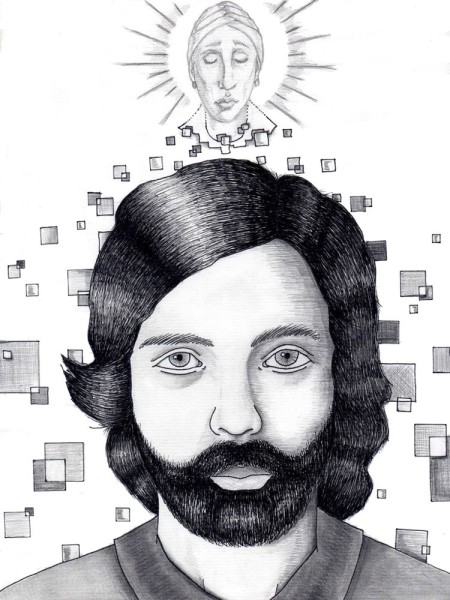Customers cannot call the whip-its “whip-its.” They cannot refer to them as “nangs” or “nossies” or “laughing gas.” In our shop, the sanctioned nomenclature for the small, huffable canisters of nitrous oxide is whipped cream chargers. We keep a sign posted at the register reminding everyone of this critical distinction. You can’t miss it. I taped it up there personally, a big square of neon poster board hanging between the shelves of chargers and a wall display of flavored prophylactics. Yet some people still succumb to bouts of spontaneous illiteracy and ask for whip-its anyway. We aren’t allowed to sell to these individuals. Whenever we tell someone about this policy, they want to know why. They want to argue. What’s it matter what I call it? goes a typical response. That don’t change what it is.
This is true, of course. If how you described something altered its physical properties then my apartment would be a thatched-roof hut and my five- and six-year-old sons—my two big, strong guys—would stand taller than my waist and be able to for real beat me in arm-wrestling. Despite the statement’s empirical accuracy, however, that reasoning won’t hold up in court. And that’s the short answer for why it matters: it be the law. But here’s the long version. The name speaks to intent. A whip-it is a recreational drug—an inhalant abused for its psychoactive qualities and often taken concomitantly with other narcotics such as ecstasy—whereas a whipped cream charger, on the other hand, is a legal product with legitimate, everyday applications in realms both culinary (making whipped toppings for desserts) and erotic (making whipped toppings for consenting adults). We, as a law-abiding adult retail establishment, do not condone nor facilitate recreational drug use. Although we very much hope that you’ll continue to rely on us for all your edible body topping needs.
This was the rule I broke when I sold three boxes of whip-its to an undercover cop. I should’ve known he was police. Our county had stepped up all areas of drug enforcement in recent months after a spike in overdoses during the summer; as a result of the crackdown, a sales associate from a competing business had already been charged with misdemeanor distribution over nitrous sales and pled out to fines and community service. Besides, the officer looked nothing like the frat boys and candy ravers and club kids who were the main purchasers of whip-its. He was well-built, mid-thirties, but timidly bearded, the facial hair on his cheeks and chin and neck all different lengths, none as girthy and robust as his push-broom mustache, as though he’d tried and discarded several previous looks in quick succession, his overall style one of chameleon impermanence. These details escaped me at the time, though. I’d been distracted and not sleeping well of late. My wife’s deteriorating health, her hospitalization in the palliative care unit, had left me with only the bare, primitive cognition to feed our sons, get them dressed and to school each morning.
The officer approached the register, slid the latest issue of Barely Legal across the counter, and said, “Let me get three boxes of whip-its, too.” I complied. I completed the transaction unthinkingly, thinking only about my weekend off when I planned to take the kids to visit their mother again on her sleepover. That was what we’d been calling it. The cancer was first detected when the boys were still toddlers, too young to understand where their mother was going—were they even old enough now?—and we’d grown to referring to all her hospital stays as sleepovers, including her latest after the final round of chemo failed and she became too unwell to come home. I told my boys the same thing: Mom was on a sleepover.
The officer took his purchases. The metal canisters of nitrous clinked inside their boxes as he walked out. Once he exited the shop, he returned accompanied by another officer in full uniform, radio chirping on his hip. His partner asked me to step out from behind the counter and placed me under arrest, recited my Miranda rights.
“Call my babysitter,” I said to the manager, who’d emerged from an aisle of handcuffs and leather restraints to plead for leniency on my behalf. “Four zero seven, eight five five—” I began dictating the contact information, repeating it until I’d seen that my supervisor had written it down.
One night in jail and one hundred hours bagging litter downtown would be the ultimate cost of the arrest. The store manager, after posting my bond and giving me a lift back to my car, assured me that my job was safe. He knew the family situation. Were he in the same position, he told me, he’d hope for similar compassion.
At home, I relieved the babysitter of her duties. My boys ran into the entryway of the apartment to greet me and hug my legs, one apiece, refusing to let go. I kissed the tops of their heads and shooed them away, and then, once in private, thanked the babysitter for staying and promised her overtime pay. How was everything, how did things go? I asked her. “Fine,” she said, “but I told them you were on a sleepover, and they wouldn’t stop crying.” It was Saturday. Later that afternoon the boys and me would go see their mother at the hospital, confined in her bed, pale and underweight, laboring to say hello or I love you. On her sleepover. The boys had returned to the living room and were playing a racing videogame. They were not deft with the controllers. Their vehicles scraped along railings, took out small trees and traffic signs, and sailed over cliffs where they floated midair briefly, suspended, defying the truth of gravity, before falling inevitably into bodies of virtual water.


